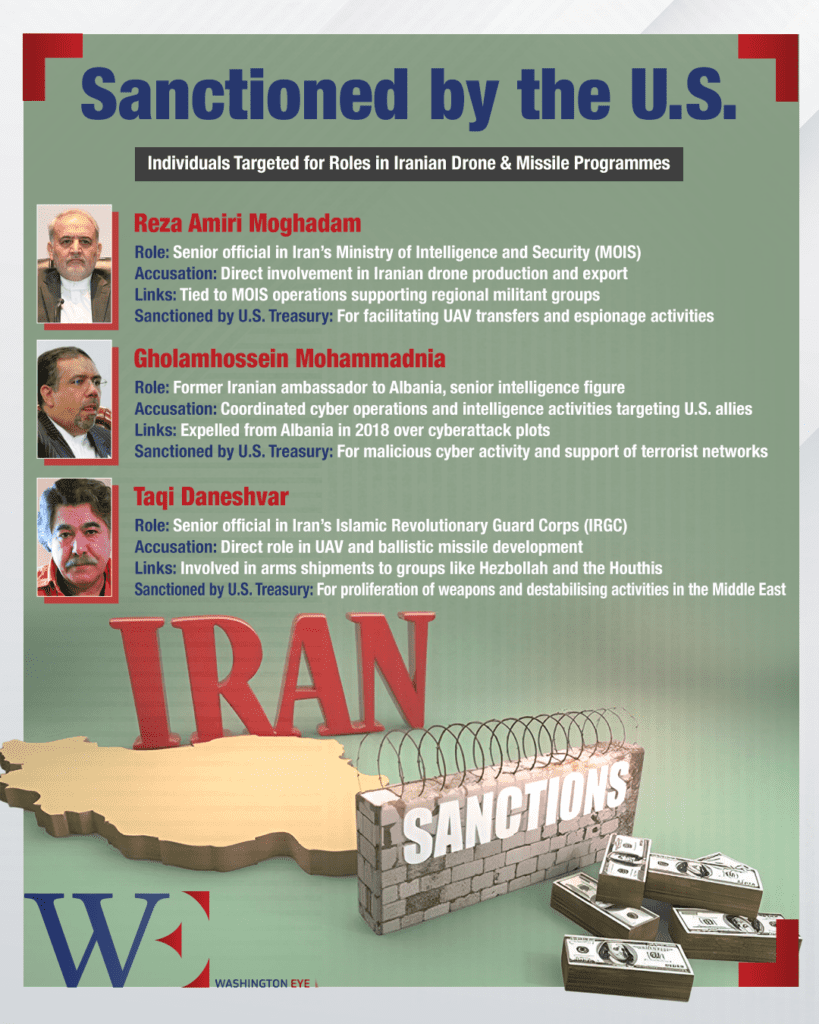On March 25, 2025, the U.S. Department of the Treasury imposed sanctions on three Iranian intelligence officers—Reza Amiri Moghadam, Gholamhossein Mohammadnia, and Taqi Daneshvar—for their alleged involvement in the abduction, detention, and probable death of former FBI agent Robert Levinson. This action underscores the U.S. government’s ongoing commitment to seeking accountability for Levinson’s disappearance and holding the Iranian regime responsible.
These sanctions are part of the U.S. government’s long-standing pressure campaign against Iran, particularly targeting entities and individuals involved in human rights abuses, terrorism, and illicit activities. By blocking these officials’ assets and restricting financial transactions, the U.S. aims to deter further acts of state-sponsored abductions while signaling to other authoritarian regimes that such actions will carry severe consequences. This approach also fits within the U.S. policy of using economic measures as a tool of diplomacy and coercion, rather than direct military engagement.
The sanctions also reflect the deeply strained U.S.-Iran relations, which have been shaped by decades of mistrust, nuclear negotiations, and regional conflicts. While Washington has periodically engaged in diplomatic talks with Tehran, incidents like Robert Levinson’s disappearance reinforce the narrative of Iran’s hostile activities and its disregard for international norms. These measures could further complicate ongoing discussions on Iran’s nuclear program and regional security, as Tehran may perceive them as a sign of continued U.S. aggression. However, from the U.S. perspective, ensuring justice for Levinson remains a non-negotiable issue, demonstrating that human rights violations will not be overlooked in the broader geopolitical equation.
Background on Robert Levinson’s Disappearance
Robert Levinson, a retired FBI agent, disappeared on March 9, 2007, during a trip to Kish Island, Iran. Initially, the Iranian government denied any knowledge of his whereabouts. However, over the years, evidence has emerged implicating Iranian officials in his abduction and detention. In December 2020, the U.S. government sanctioned two senior Iranian Ministry of Intelligence and Security (MOIS) officers, Mohammad Baseri and Ahmad Khazai, for their direct involvement in Levinson’s case.
The recent sanctions target three additional individuals including Reza Amiri Moghadam- a senior MOIS officer with a history of involvement in sensitive national security matters, Gholamhossein Mohammadnia- former Iranian ambassador to Albania and MOIS official and Taqi Daneshvar- an MOIS officer engaged in counterespionage activities. These individuals are accused of playing significant roles in Levinson’s abduction, detention, and the subsequent cover-up of Iran’s involvement. The sanctions block any property or interests in property of these individuals within U.S. jurisdiction and generally prohibit U.S. persons from engaging in transactions with them. Additionally, foreign financial institutions that knowingly facilitate significant transactions for these individuals risk exposure to U.S. sanctions.
Treasury Secretary Scott Bessent emphasized Iran’s human rights abuses, stating, “Iran’s treatment of Mr. Levinson remains a blight on Iran’s already grim record of human rights abuse.” He reaffirmed the Treasury Department’s commitment to working with U.S. government partners to identify those responsible and highlight their actions.
The Levinson family has long sought answers and accountability for Robert’s disappearance. In a statement, they expressed gratitude for the U.S. government’s efforts and reiterated their commitment to pursuing justice. They emphasized the importance of holding Iranian officials accountable and called for continued pressure on the Iranian regime to provide a full accounting of Robert’s fate.
International Implications
These sanctions are part of a broader strategy by the U.S. to address Iran’s human rights violations and destabilizing activities. By targeting individuals involved in Levinson’s case, the U.S. aims to send a clear message about the consequences of such actions. This move may also influence diplomatic relations, as it underscores ongoing tensions between the U.S. and Iran over issues of accountability and human rights. The U.S. government’s decision to sanction additional Iranian intelligence officers reflects a steadfast commitment to seeking justice for Robert Levinson and his family. It also highlights the broader imperative of holding individuals and regimes accountable for human rights abuses and violations of international norms. As the international community continues to monitor Iran’s actions, these sanctions serve as a reminder of the enduring consequences of such conduct.















